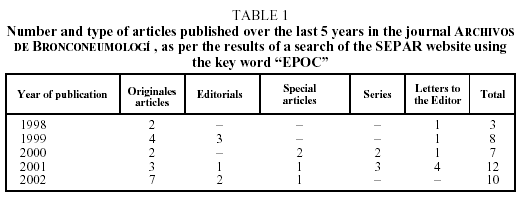To the Editor: It was with great interest that we read the editorial by Rodríguez Roisin et al1 briefly and accurately summarizing the activities planned by the committee on chronic obstructive pulmonary disease (COPD) of the Spanish Society of Pulmonology and Thoracic Surgery (Comisión EPOC de la Sociedad Española de Neumología y cirugía Torácica - SEPAR) for 2002, the year designated as "COPD Year". The authors also reflect on the factors that have favored the current positive attitude of the international community of pulmonologists towards this disease. We would, however, like to comment on one aspect that we consider to be of the utmost interest in facilitating knowledge and debate about COPD and, even more important, the dissemination of this knowledge to the general public and the media: we are talking about the importance of agreeing on one name for this disease.
Using the "advanced search" option on the SEPAR web site we searched the journal Archivos de Bronconeumología for articles published over the last five years containing the term "EPOC" (the Spanish abbreviation equivalent to COPD) in the title, abstract, or results (Table I). We could discuss the fact that the number of original articles is excessively low given the interest in this disease, 2002 being one of the most productive years with seven original articles. We could mention that 2001, with 12 items on the subject, was the year in which we found the largest number of pieces about COPD. But we could also make the point that these figures do not reflect reality. If we analyze the issues of Archivos de Bronconeumología published in 2002, for example, we find that there are more articles about COPD than the search results for "EPOC" indicate. Why, therefore, were they not included in the search results? Simply because they do not mention the abbreviation "EPOC", but rather use only the full form: chronic obstructive pulmonary disease.2-6 Is this important? We think it is.
We are all aware of the fact that the abbreviation "EPOC" has not yet gained general currency in the Spanish speaking world. Even the majority of our patients suffering from COPD do not use the term. They still talk about chronic bronchitis or emphysema, not even about chronic obstructive pulmonary disease. Recently we made a local television program about COPD for World COPD Day 2002. The surprise was that the next day our patients mentioned that they had seen us on television talking about a very rare disease. It was the disease they were suffering from. They followed the treatment well, and they had even stopped smoking, but they did not know that this strange illness -- "the POC" they called it -- was the disease that they themselves had.
Unlike what happens with other lung diseases, where the English name is similar to the Spanish, thereby facilitating the dissemination of information in the media (asmaasthma, neumoníapneumonia, tuberculosistuberculosis, cáncercancer), the abbreviation "EPOC" only makes sense in the context of a Spanish-speaking community. We do not benefit from the echo of this name in neighboring countries. And, if this were not enough, we talk about "EPOC" and its expanded Spanish form (enfermedad pulmonar obstructiva crónica) as well as chronic bronchitis, and emphysema. We should concentrate all our efforts on finding one name for the chronic airflow limitation caused fundamentally by smoking and design a strategy to raise the awareness of the general public of the importance of this disease. Perhaps it is not yet too late to "invent" a new name with greater social impact. Meanwhile, we should all agree, at least among pulmonologists, to call this disease by one name in Spanish: "EPOC" perhaps?












